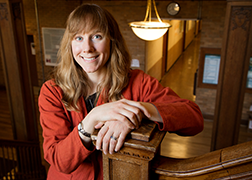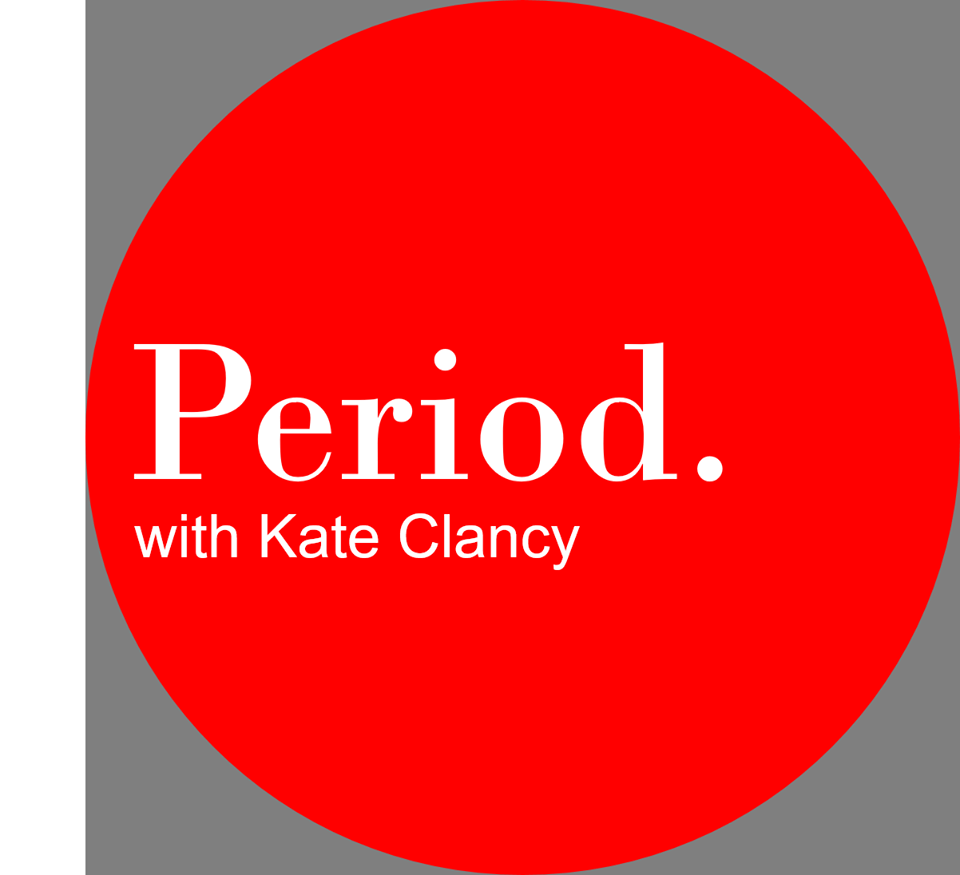Dr. Kathryn B.H. Clancy is an Associate Professor of Anthropology at the University of Illinois whose work focuses on the ways in which stress, lifestyle, and environment affect women’s health. As a biological anthropologist, feminist, longtime blogger and former writer for Scientific American, Dr. Clancy is passionate about approaching science through the lens of intersectional feminism and about bringing her work to audiences beyond the academy. Her most recent project is her Period Podcast, which she describes on her website as exploring “anything and everything to do with the menstrual cycle, most especially the bloody bits.” As the podcast nears the end of its first season, I sat down with her to talk about her transition from blogging to podcasting, her goals for the show, and the state of women’s health in the aftermath of the presidential election.
Answers have been edited for length and clarity.
 SP: You’ve been doing outreach beyond the academy through blogging and in your writing for Scientific American for years — how did you transition into podcasting?
SP: You’ve been doing outreach beyond the academy through blogging and in your writing for Scientific American for years — how did you transition into podcasting?
Kate Clancy: Part of it was I hit a point where it was hard to maintain writing blog posts that weren’t just “life of an academic” posts. I was like, how many work-life balance articles can I really put up before it feels redundant? But the more intensive research ones were taking too much of my writing time, which I really needed to devote to my own research and writing grants.
I started getting into podcasts because I realized oh, I could do something where I have these 12 discrete episodes, and that felt like it might be a more humane work flow for me.
SP: What prompted you to start a podcast specifically about periods?
Clancy: I knew I wanted it to be somehow related to science and women’s health, because that’s where my interests lie and that’s what I do. And it didn’t take me very long to arrive on periods, just because you can branch off from that topic everywhere.
There are only one or two podcasts that are focused on periods, but none of them are done by scientists. And most of the stuff I see are people who are like, “Let’s smash this taboo!” Which is super important; I completely agree. But there’s a lot of science behind the menstrual cycle and no one seems to know anything about it. For me, I definitely talk to period activists and talk about things like menstrual stigma or menstrual taboos. But within that, what I’m trying to do is intentionally sprinkle in conversations with actual scientists about the science of periods.
SP: What are the differences you’ve found between blogging and podcasting?
Clancy: The one time I did a survey of people who read my blog, it was mostly white women with PhDs. But when people do market research on podcasts, there’s a huge amount of racial and ethnic diversity in terms of who listens. I also don’t want to do something that only people with PhDs are gonna read. I want to do something that there’s at least a chance that more people will listen to.
And then, I put in a lot of effort of make sure the people I invite onto the podcast are [diverse]. I mean so far, I’ve only spoken to women with the exception of one little boy, but there’s been pretty good amount of racial diversity. So that’s what I’m also aiming for — to make sure that I have one third, if not higher, people of color interviewed for the podcast.
SP: Have you gotten any criticism or pushback so far for discussing women’s health and periods?
Clancy: Actually, so far they’ve all been from women.
SP: Really? Interesting, tell me about that.
Clancy: One of the podcasts I really want to do is one about trans menstrual cycles and genderqueer menstrual cycles. I think it’s a really important topic. So, somehow on Twitter I got into a conversation with some women who mocked Planned Parenthood for using the term “menstruators.” They said, “You mean, ‘woman’ not ‘menstruaters’? Don’t reduce us to our menstruation!” And I was like, “Actually that’s great to include anyone who has a period, because they’re not always women.” And then these folks started coming after me “How could you say this? You’re a traitor to women.”
And then, more recently I did a political podcast addressing the role white women played in the election, and that was very intentional. At the end, I spend some time explaining why someone who studies periods would be really concerned by the results of this election. But I got some hate mail from a white woman who said, “I’m a white woman who voted for Trump but I’m not a racist, how dare you. I signed up for this podcast thinking I was going to learn something, but instead I got called a racist.”
So far that’s it — so far I’ve had really positive responses. But I’m small time, it’s always going to be a niche topic, so I’m not expecting for it to be a big podcast. I think that’s most of what’s going to protect me from trolls.
SP: Has anything else surprised you about the responses to the show?
Clancy: The two unexpected things have been, number one, the number of men who have contacted me who have listened to it and been like, “Oh, have you thought about this topic?” Or who are clearly recommending it to their friends on Twitter.
The other thing is the number of women who have come to me and said, “I’ve been listening to this with my daughter.” And like, ten-year-old daughter. But that’s really cool too, that it’s being used by some parents as an educational thing, that they’re sharing it with their kids.
SP: Finally, you’ve talked about the election and the politics of reproductive health on the show, do you have advice or thoughts on what people should be doing to fight for these issues in the aftermath of the election?
Clancy: I think certainly being involved in Periods for Politicians is good, just liking them on Facebook so you can see their posts, is certainly one way to be aware of what’s going on [You can listen to Kate’s interview with the group’s founder here].
The other one is donating to Planned Parenthood and then donating to some specific Planned Parenthood. Donating to your local one is always a good idea, or to other independent abortion providers in your area.
Also, being involved in local efforts around eliminating racism is really important. I’m trying to get involved in Showing Up For Racial Justice, the local chapter. So for me, it’s trying to get more involved in local politics in general. When we lift everybody up, we can all move forward together.
And the other thing is to keep making beautiful things, making things that you care about. For me, making the podcast is something I really care about. And I’m not an artist, I don’t have a creative outlet in any other way. So for me this is how I can be creative. It’s that and making bread on the weekends.
SP: Thanks so much for chatting, and I’m looking forward to the last two episodes of the season!
You can find the PERIOD Podcast on iTunes and on her website KateClancy.com. You can also follow her on Twitter @KateClancy or @periodpodcast2.








